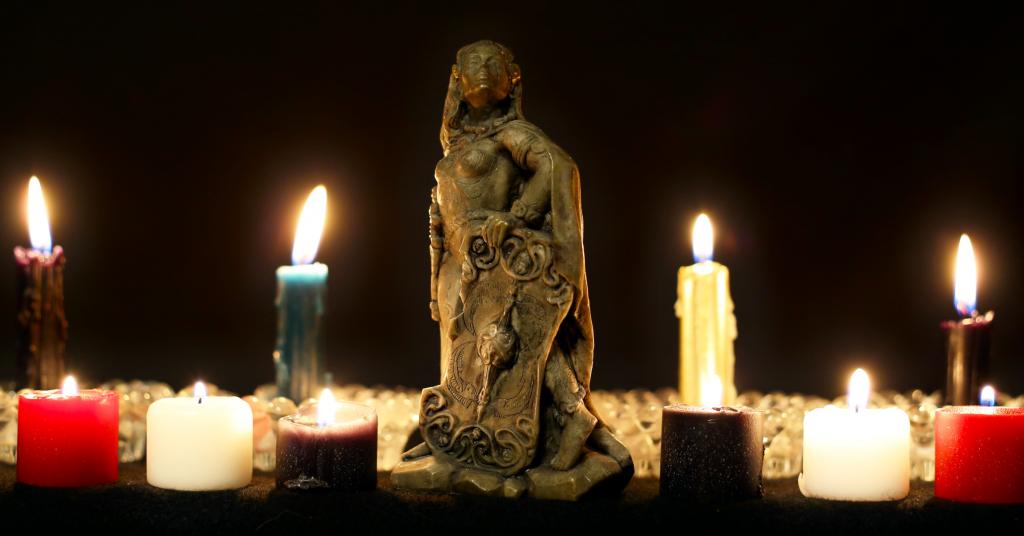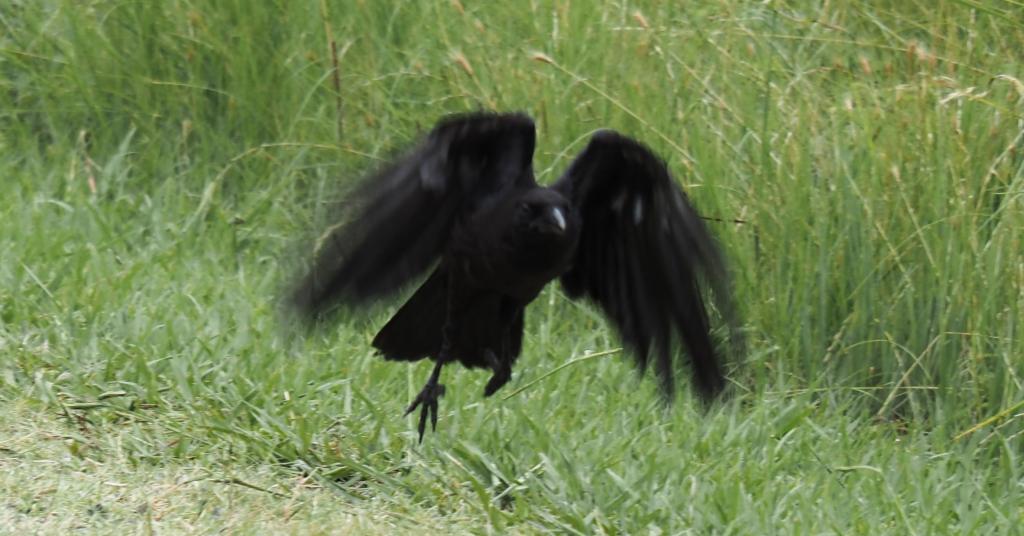I’ve written a lot about the Morrigan over the years – much of it at Her direction. And so I get questions about the Morrigan, especially from people who are just starting out. They ask for recommendations on books, prayers, offerings, and how to go about worshipping and working with Her. Sooner or later, most ask – in one way or another – a very important question:
“How can I avoid offending Her while I’m getting started?”
On one hand, I appreciate questions like this. They mean people are taking the Morrigan seriously – they understand they’re dealing with a fearsome Battle Goddess.
On the other hand, I worry that they’re holding themselves back from an amazing and fulfilling experience due to unnecessary fear.
And so I say to those who are worried about offending the Great Queen and the consequences that might bring: it’s good to be reverent and respectful.
But the Morrigan didn’t call you up just so She could smack you down.
Cruelty is not a virtue
For better or for worse, many of us see the Gods as our parents. Some of us had good, supportive parents. Others had bad parents, and our experiences of them color our thinking about the Gods.
And in Western culture, it’s hard to break free from the conservative Christian view of a God as an abusive parent waiting to cast you into eternal torment for the slightest mistake.
What all of this describes is cruelty: causing others to suffer out of indifference or for self-aggrandizement.
Cruelty is not a virtue, and the Gods are always virtuous. Sometimes why They do what They do is a mystery. More often, we attribute to the Gods what should be attributed to ourselves, to other humans, and to the randomness of life.
The Morrigan is a Battle Goddess. She can be demanding, and at times, harsh. But She is never cruel, because cruelty is not a virtue.
A little fear is a healthy thing
That said, a little fear is a healthy thing.
Last week I watched a video of a hill climb auto race. The video was taken with a dashcam – it gave a driver’s perspective of the race. I was fine watching the straightaways and the moderate curves. But when the road curved sharply, with a steep drop-off, with no guard rail, my gut said “oh hell no!”
The driver took the curve at least three times faster than I would have done. She was a pro – she could do that. My fear of flying off the cliff is a healthy reminder that I don’t have those skills and I need to adjust my driving accordingly.
The Morrigan is a God – the mightiest of spirits. Whatever we are, whatever power we may have, She is more. More than that, She is a God whose primary interests are sovereignty, battle, and the aftermath of battle. These are scary things and so we’re wise to move forward with care.
The key is to take care so we can move forward, and to not allow our fear to keep us from doing what we’re called to do… and what we want to do.
Reverence is always a good idea
Beyond the practical concerns about dealing with a God, there are the religious concerns: a God is a divine person. As such, approaching Them with reverence is always a good idea.
The dictionary defines reverence as “honor or respect.” It’s an acknowledgment of Their virtues, Their deeds, and Their wisdom. It’s an acknowledgement that They are more than us.
This definition says nothing about self-debasement. You need not – and should not – demean yourself to praise the Morrigan or any other deity. We are not Gods, but we are still beings of inherent dignity and worth – as is every other person on this planet.
In practice, reverence is a certain formality: using titles and epithets, practicing good hospitality, listening carefully, and assuming nothing. It’s making the Morrigan and the other Gods we follow a top priority in our lives.
Over time, you may – or may not – develop a familiarity with a God. I have a certain familiarity with Cernunnos – I have far less with the Morrigan. If you have that, treasure it. But never take it for granted, and never forget Who you’re working with and for.
Know Who you’re dealing with
The first step in honoring the Morrigan is to learn all you can about Her. Much of the fear I see in people who feel called to Her stems from a lack of knowledge about Her. We hear the scary stuff but not its context, or what happens after the scary stuff is done. Read and study – learn who the Morrigan is, and who She isn’t.
Don’t just learn the ancient lore – listen to Her contemporary followers. In doing so, you get a better idea of what She’s likely to ask you to do here and now.
The Morrigan calls more than warriors. She calls people in different life situations. And She demands persistence, not perfection.
Keep your word
If there is one thing to be concerned about, one thing to put at the top of your list, it’s this: always keep your word.
There’s a utilitarian aspect to this. When people have kept their word in the past, we can trust that they’ll keep it in the future, and so we can bargain and plan in confidence. Trust leads to stability which leads to growth.
The Morrigan is not unreasonable when it comes to extenuating circumstances – sometimes you can renegotiate. But I can tell you from first-hand experience that She has little patience with “this wasn’t what I was expecting” or “this is hard” or especially “this is inconvenient.”
Do what you said you would do. Even when it’s inconvenient and even when it’s hard. And especially when you think you can’t get through it. Just keep moving – the finish line may be sooner than you think.
Over time, the expectations get higher
The Morrigan didn’t call you up just so She could smack you down. If you make a mistake – and you will, because you’re human – acknowledge it, fix it as best you can, and move on. Beginners make mistakes. Gods, in their wisdom that is greater than ours even if it isn’t infinite, understand this. They don’t expect perfection because They know perfection isn’t possible.
But over time, the expectations get higher. Mistakes that used to be laughed off now carry consequences. Forgetting to make an offering goes from “just do it next time” to “I don’t care if it’s 2 AM – go do it now!”
And the workload always goes up.
I’ve experienced this with the Morrigan far more than with any other deity. Is it because She’s a general who wants every piece of her army in top shape? Is it because She wants Her followers to be as strong and capable as we can be? I don’t know. She hasn’t told me and I don’t expect She ever will.
The Morrigan has patience with beginners. But at some point, you’re not a beginner anymore.
Many Gods, many people, many ways
I write from my own experiences and from the experiences of others I know and trust. I’m confident that what I say is generally true, not just concerning the Morrigan but most other deities as well. But what I say is not universally true.
I know people who the Morrigan has dealt with harshly. In some cases I have suspicions as to why that might be. In other cases I flat out don’t know, and when I’ve asked Her I’ve been told to keep my focus on my own work. The bottom line is that there are exceptions to all this.
But they are exceptions, not the rule.
What I write here is generally true, and you are safe in assuming it applies to you… unless you have reason to believe it doesn’t.
Recommended resources on the Morrigan
Since you’re already here, start with my other posts on the Morrigan. Most of them are like this one, grounded in my experiences of Her.
For books, start with Morgan Daimler’s The Morrigan – Meeting the Great Queens and Raven Goddess: Going Deeper with the Morrigan. These are short, concise, easy to read books in the Moon Books Pagan Portals series.
Then check out Lora O’Brien’s Irish Pagan School. Lora brings a native Irish approach to her work with and for the Morrigan. Some of the material on her website is free, while other material is part of her paid classes.
The Book of the Great Queen by Morpheus Ravenna is an extensive analysis of the literary, historical, and archeological records of the Morrigan and the Celtic societies in which She was first worshipped. It’s much longer and much denser than either of Daimler’s books, but it’s a great resource.
The Morrigan: Celtic Goddess of Magick and Might by Courtney Weber is a more experiential and subjective book than the others – it’s more like my blog posts than Daimler’s or Ravenna’s books. But it’s full of good stories, both ancient and contemporary.
There are other books on the Morrigan. Either I have not read them and therefore cannot comment on them, or I have read them and I do not recommend them. I am confident these are worth your time and money.




















